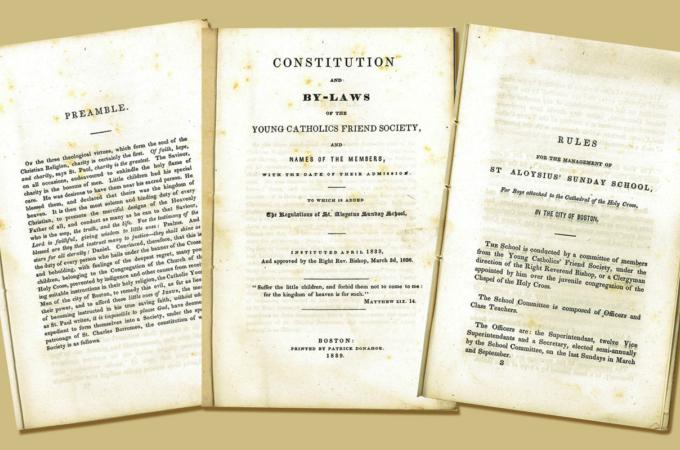The Young Catholics' Friend Society
Within the archive's manuscript collection is a booklet dating to 1839, which contains the constitution, by-laws, and other information related to the Young Catholics' Friend Society.
According to the booklet, the first meeting of the society took place on Saturday evening, April 4, 1835. Those interested in forming a Catholic men's society met at 18 School Street, the site of the first public Catholic Mass in Boston, and passed three resolutions. The first was that a five-person committee be appointed to draft a constitution for the organization, the second that the organization would be known as "The Young Catholics' Friend Society," and the third that the proceedings shall be signed by the chairman and secretary and subsequently published in the Literary and Catholic Sentinel newspaper, which would later be renamed The Pilot.
A preamble reveals information about the society and its purpose. It begins by stating that "of the three theological virtues, which form the soul of the Christian Religion, charity is certainly the first. 'Of faith, hope, and charity,' says St. Paul, 'charity is the greatest.'" The preamble continues, saying that having taken this into consideration, the society believes charity is the duty of every Christian person and wishes to address the problem of poor children within the congregation of the Cathedral of the Holy Cross. They claim these poor Catholic children are "prevented by indigence and other causes from receiving suitable instructions in their holy religion," and so it is the mission of the society "to remedy this evil" and provide religious instruction for them.
The first several articles of the constitution name officer positions to be filled, elected by a majority at semi-annual meetings in April and October, and define the duties of each. A "Clothing Steward" was also appointed to collect donated clothing or purchase what was needed, using the society's funds, and see that it was distributed to children in need. It also allowed for five trustees "to investigate the circumstances of the several indigent Catholic children, see whether they are fit objects of charity, and report accordingly."
Another focus for the trustees was identifying Catholic children who attended non-Catholic Sunday schools so attempts could be made to return them to their faith. The latter was not uncommon in the early 19th century, though perhaps less so in the cities. There were few churches in New England -- and even fewer priests -- so Catholics living in more remote areas could sometimes wait months for a priest to visit. In the meantime, they fell into the habit of attending the churches, and it appears Sunday schools, of other denominations that were more easily accessible. This appears in several documents in the archive and was a habit that Catholic priests tried to discourage.
Any male of good moral character and who received a two-thirds vote of acceptance by current members could join the society. Dues amounted to one dollar at the time of joining the society, and 12.5 cents monthly. Students who graduated from the Cathedral Sunday school were admitted free of expense unless they intended to hold an office. Anyone who made a charitable contribution to the society or aided them in some other way was named an honorary member. The society met the second Sunday of each month.
The constitution of the society names various processes for the removal of members or officers and for passing amendments. The by-laws state, in 11 articles, how meetings shall be conducted. There is also a printed list of members along with their date of entry, highest office held, and date of death where applicable, and afterward prayers to be recited at the beginning and end of each meeting.
Finally, the booklet finishes with several pages of rules for the operation of "Saint Aloysius' Sunday School," which was operated by the society for boys attending the Cathedral of the Holy Cross. Society members served as teachers under the direction of the bishop of Boston, at this time Benedict Fenwick, or any clergyman he wished to appoint. Members of the society also filled supervisory roles in the form of a superintendent, one of 12 vice superintendents, and a secretary. In addition to weekly lessons, teachers were responsible for reporting to the bishop which of the students were ready for confirmation and providing nominations for awards given out on the feast of St. Charles Borromeo, the patron saint of the society.
- Thomas Lester is the archivist of the Archdiocese of Boston.



















